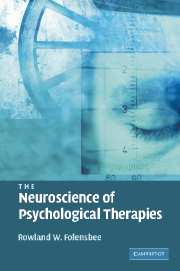Book contents
- Frontmatter
- Contents
- Acknowledgements
- 1 Introduction
- Part 1 Basic concepts
- 2 Neuropsychological concepts
- 3 Neural networks
- 4 Memory and learning
- 5 Affect
- 6 Anxiety
- 7 Processes of brain development
- 8 Themes of brain development
- 9 Basic concepts: summary and integration
- Part 2 The process of psychotherapy
- Appendix: Neuroimaging and psychological therapies
- References
- Index
3 - Neural networks
Published online by Cambridge University Press: 15 December 2009
- Frontmatter
- Contents
- Acknowledgements
- 1 Introduction
- Part 1 Basic concepts
- 2 Neuropsychological concepts
- 3 Neural networks
- 4 Memory and learning
- 5 Affect
- 6 Anxiety
- 7 Processes of brain development
- 8 Themes of brain development
- 9 Basic concepts: summary and integration
- Part 2 The process of psychotherapy
- Appendix: Neuroimaging and psychological therapies
- References
- Index
Summary
The previous chapter characterized the brain's processing of experience as a sequential flow of discrete neural events occurring in various locations throughout the brain as information moves from input to output. The description emphasized the “bits and pieces” aspect of brain function. At the same time, the brain's representation of each experience can also be conceived as a single, unique, integrated pattern that includes neurons from widely dispersed areas of the brain (Levine, 2000). Each moment of an experience is a neural network. Each experience is simultaneously bits and pieces of activity and a unified collection of brain processes. The neural network concept provides a framework within which details of various brain processes can be examined. The neural network concept can improve understanding of how individual parts of the brain influence the overall experience of life and how experiences in life are brought to the psychotherapy setting (Vaughan, 1997).
The neural network for any single experience is conceived to be composed of neurons from throughout the brain (see Figure 3.1). Two separate experiences are represented in Figure 3.1, with each experience including neurons from the same areas of the brain, but not sharing individual neurons. The schematic representation includes two sensory areas: an area related to cognitive processing and an area related to processing of emotions. Each individual experience has the potential to include elements from throughout the brain (see to Figure 1.1).
- Type
- Chapter
- Information
- The Neuroscience of Psychological Therapies , pp. 17 - 28Publisher: Cambridge University PressPrint publication year: 2007
- 1
- Cited by



